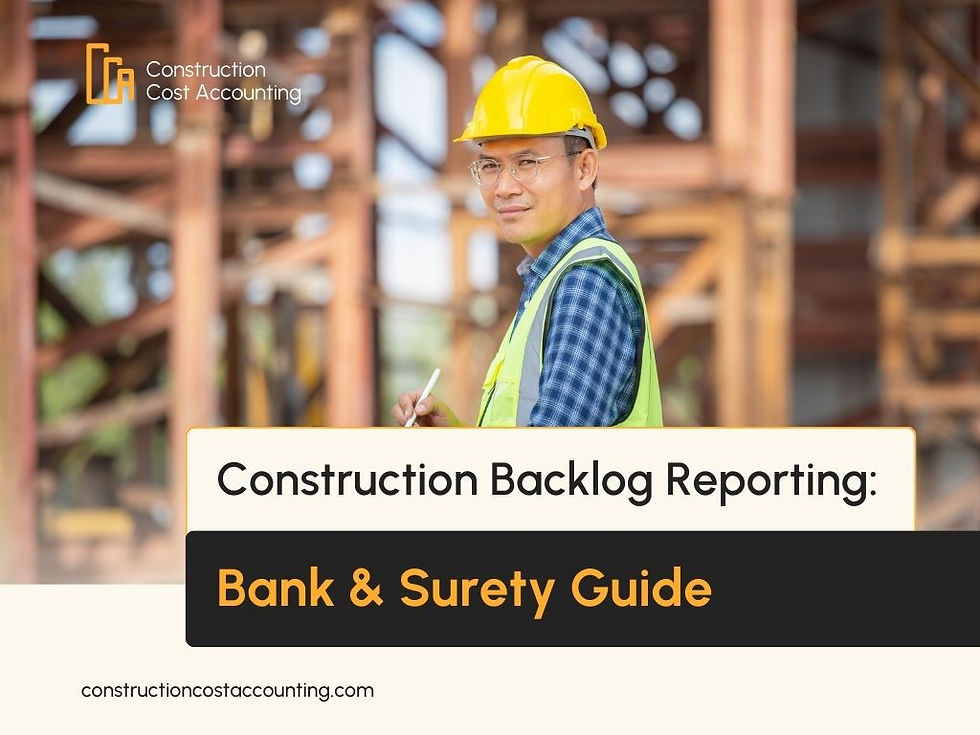WIP Report: A Holistic View of Stakeholder Perspectives
- Joy Nguyen

- May 10, 2023
- 4 min read
Updated: Dec 19, 2024
As a construction business owner, understanding your company's financials is crucial to ensuring its success. One of the most important reports you will use is the Work in Progress (WIP) report, which gives you critical insights into your job costs, revenue projections, and cash flow needs.
In this post, we will break down what the WIP report is telling you and how various stakeholder perspectives about WIP analysis to better manage risk, identify growth opportunities and ensure financial stability.
Table of Content:

What is the WIP telling us?
The Work in Progress (WIP) report helps construction business owners manage their financials and plan for the future by providing critical insights into:
Calculate over/underbilling
Project short-term and long-term financial needs
Reconcile job costs and general ledger
Plan for cash flow
Identify tax planning opportunities
Beyond the Owner: Who Cares About Your WIP?

Who would be interested in analyzing a construction WIP schedule? There are more people than we might think!
Did you know that even the estimating department is interested in a contractor's work in progress (WIP)? By getting timely updates and feedback, estimators can see where costs may need to be increased or where issues are arising on specific jobs.
For example, if a contractor realizes that a project isn't going as well as they thought, they can increase their cost estimates to make sure they don't end up losing money. And by digging into the specifics of the issues, they can figure out how to improve for next time.
So don't forget - even the estimators care about the WIP!
Understand Different Stakeholder Perspective Priorities Regarding WIP Report
Different stakeholders have different perspectives on the WIP:
1. CFM/CFOs:
First, they want to know about the overbilling/underbilling calculation. They want to know what is going on with the over/underbilling calculation. Which jobs are under or over-billed? And do they need to be concerned about that?
Second, they want to see long and short-term financial projections. They want to know what WIP means to their future. What is their revenue going to look like? And how is this backlog going to burn off?
2. Senior Executives (CEO, COO, President):
First, they want to analyze job profitability by type. They look at various factors such as geography, project manager, division, superintendent, and customer to determine which WIP is performing well and which is not, and why.
Then, this information is used to make strategic decisions about the company's future.
Second, they want to see historical trend analysis and benchmarking. They want to see how they stack up compared to others - and even compared to themselves. For example, they had a kind of a bell curve for their revenue and profit last year during the course of the calendar year. What's it looking like so far this year?
3. External CPAs:
An external Certified Public Accountant (CPA) ensures the accuracy of financial statements and job cost procedures and controls.
Good CPAs will not only ensure that every number looks right but also be team players who are willing to ask questions and correct any issues that arise in the WIP.
4. Banks:
All about CONSISTENCY! Your bank is interested in assessing the consistency of earnings and cash flow issues related to over/underbilling to ensure your company is not at high-risk, is financially stable, and is capable of paying off your lines of credit.
5. Sureties
Sureties are underwriters who are skilled at understanding WIP and knowing what to look for. They assess outstanding risks on uncompleted contracts and are concerned about job borrow. They compare the percentage of cash you paid out to the amount that you should have received to ensure you have the ability to stay afloat financially.
Additional Stakeholder Concerns in WIP Management

Identify Risks and Opportunities with WIP Analysis
By analyzing the WIP report, construction business owners can identify potential risks and opportunities, such as
RISKS | OPPORTUNITIES |
|---|---|
Potential threats to job profitability, cash flow, and credit needs | Potential areas for tax savings and planning |
Issues with job scheduling, workforce productivity, or supply chain disruptions. | Upcoming credit needs for future projects. |
Potential risks with compliance and legal requirements | Insights gained to make informed decisions about future projects and business growth. |
By understanding the WIP report and analyzing it from various stakeholder perspectives, you can better manage risks, identify growth opportunities, and ensure financial stability for your construction business.
Don't overlook the power of WIP analysis in maximizing profits and building a successful future.
In Conclusion
Stay ahead of financial risks and capitalize on growth opportunities by analyzing the WIP report and collaborating with stakeholders. Our CCA bookkeeping service firm can help you leverage the insights gained from the accurate WIP report to take your construction business to the next level. We also credit CFMA's Deep Dive and Advanced Perspective of Work in Progress - Day 2 Course for their valuable insights and contributions to this topic.
Don't let financial risks hold you back! Contact us today to learn more about our WIP Analysis Services and how we can help you maximize your construction business's potential.





Comments